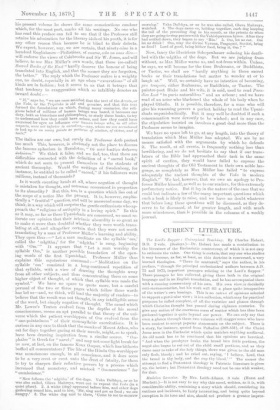CURRENT LITERATURE.
The Lord's Sipper: Uninspired Teaching. By Charles Hebert, D.D. 2 vols. (Seeleys.)—Dr. Hebert has made a contribution to the literature of the Eucharistic controversy, of which it is not easy to estimate the value. One thing is certain, that any one who studies it may become, as far, at least, as this doctrine is concerned, a very learned theologian. "There lie scattered," says the author, in his preface, " through the principal ecclesiastical authors between A.D. 75 and 1875, important passages relating to the Lord's Supper." These passages ho has collected, giving them both in the original language and in an English translation, and he has accompanied them with a running commentary of his own. His own view is decidedly anti-sacramentarian, but his work will fill a place quite irrespective of the writer's own leanings. This is no catena of opinions selected to support a particular view ; it is a collection, which may for practical purposes be called complete, of all the varieties and phases through which Christian thought has passed during eighteen centuries. To give any notion of the enormous mass of matter which has thins been gathered together is quite beyond our power. We can only say that even a glance through these two volumes will stagger some who have been content to accept popular statements on the subject. There is a story, for instance, quoted from Palladius (368-481), of the Christ Jesus seen in the Eucharist which quite matches anything media3val. An old monk has to be convinced that his opinions are heretical. "And when the presbyter brake the bread into little portions, the angel also began to out out of the child small portions, and as they came near to take of the holy things, there was given to the old man only flesh, bloody ; and ho cried out, saying, 1 believe, Lord, that the broad is thy body, and the cup thy blood.' " The sooner the attempt to find a Protestant theology in Patriotic literature is given up, the better ; but Protestant theology need not be one whit weaker, for that.


































 Previous page
Previous page